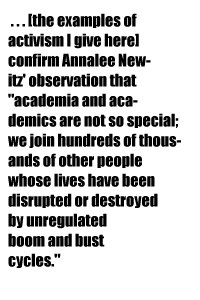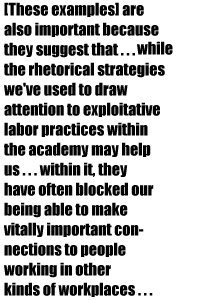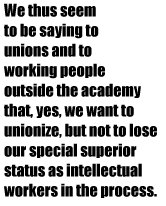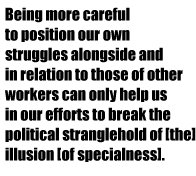

Jamie Owen Daniel
1. The comments that follow represent a slightly revised version of my contribution to a panel on "Making Connections: Education and Activism in Chicago" organized by the Radical Caucus for the 1999 meeting of the MLA. I wanted these remarks to accomplish two things. First, they are meant to provide information about several important struggles that have been or are currently being waged in Chicago. Each of these involves faculty and students both among their supporters and as activists working as members of their organizing committees, writing press releases, documenting evidence of abuses, meeting with city officials, demonstrating, etc. And each involves labor issues being faced by workers across a broad range of workplaces that are structurally similar to those we've been facing in the academy. I will describe these briefly, for reasons that should become clear as I move along to the second point I want to make, and that is to suggest why and how we might reconsider how we've been framing our public discussions of questions of academic labor, since some of the rhetoric we've been using has, in my view, functioned to block, rather than accommodate or encourage, our being able to make vitally important connections to these other workers facing similar wage, job security, and benefit issues in their workplaces.
2. These remarks, therefore, should be understood as an attempt to help further the considerable progress we've made in the last ten years not only toward organizing, but also toward understanding ourselves as workers rather than as "special" people with an almost sacred vocation for "Literature" (or "Theory" or "Teaching") who are somehow qualitatively better than all those other "ordinary" workers in other kinds of jobs.
3. First, the struggles that have been taking place here in Chicago. Again, I go into some detail here because I think this detail will be important to the point I want to make eventually about the problems in our rhetoric:
1) There have been ongoing attempts to increase workloads for caseworkers processing public assistance applications (for medicaid, food stamps, and what little welfare is still available), to up to 900-1000 cases per worker. This is being done both to encourage caseworkers, who are unionized through AFSCME, to keep potential recipients from receiving benefits for which they are eligible, and to force a systemic breakdown that could then be used as "justification" for turning caseloads and the processing of public assistance claims over to private companies such as Maximus, profit-driven companies that would give employees bonuses to get people off welfare, regardless of the human cost of doing this. In response, social science faculty and staff at various Chicago universities volunteered their skills at statistical analysis and data gathering to help an unprecedented alliance of caseworkers and clients hold a public hearing on this situation, and several served as witnesses at the hearing. As of late February 2000, processing services had not been privatized, but the Illinois Department of Human Services had begun to harass several of the most outspoken union leaders involved in the hearing.
2) A similar public hearing was held in which the 60 SEIU janitors employed by the Chicago Police Department reported on efforts by the city to sabotage their ability to get their jobs done so it could also justify replacing them with part-time workers from a private company, Windy City Temp Services. This firm just happens to be owned by a friend of Mayor Daley. In this case, workers making a living wage of $12-15/hour with full-time benefits stood to lose these jobs and then face the option of being hired back by Windy City to do those same jobs at $6-7/hour without benefits or job security. Almost entirely people of color, they reported that Latino workers were being intimidated by threats that their green card status would be revoked, while Black workers were coming into work to find their cleaning supplies gone or that the locks on the rooms where they kept mops and buckets had been changed. Unfortunately, this struggle was ultimately lost, and the Chicago Police Department privatized its custodial services on January 1, 2000. SEIU is now expecting that there will be pressure at other public institutions, including UIC where I work, to privatize (= de-unionize) custodial services
3) A third hearing heard testimony from homeless men, again almost all of them Black or Latino, who are being exploited in Chicago's burgeoning "day labor" industry. Most of these men live in homeless shelters or in boarding houses in the Mexican communities of Pilsen or Little Village; every morning early, vans show up outside shelters or on corners asking for men and increasingly women to do a day's work. The workers are driven to a work site, most often to pick crops, do landscaping work, set up displays for trade shows, clean up garbage for festivals or concerts, or to do scab work in factories. They may or may not be asked to fill out tax forms; they are often not told where they will be working or what kind of work it will be. At the end of a day's hard labor in which many get little or no time off to eat or use a bathroom, they are driven back to the shelters, handed a $20 bill for an 8-hour day, and dumped off. Those who are "luckier" get minimum wage, but a hefty fee for transporting them in the vans has been deducted from their checks. Latino workers without documentation especially are victims of this practice, which can allow employers to bypass both union wages and benefits and social security payments. After the public hearing on day labor called in Chicago in November, the Latino workers who testified were blacklisted, with representatives of the day labor services taking their pictures as they testified and then distributing xerox copies to various agencies. One of these workers had told of being driven to a farm in Michigan to harvest beans for three days; workers slept in the van at night, used the fields as toilets, and were brought meals from fast food stores. On the third day, when the beans were nearly picked, the van drove away without paying them. He and his friend had to walk several hours along the freeway before they could hitch a ride back to Chicago; they couldn't report their experience to authorities because of their tenuous immigration status.
4) Most recently, campaigns are underway to unionize workers at two of Chicago's so-called "world class" public/private cultural institutions, the Art Institute of Chicago (which employs over 1,000 workers) and the Chicago Historical Society (with about 90). In both, workers are being asked to work high-skill, high responsibility jobs, with flex time working only to the advantage of management. Many workers have been pushed to so-called "part-time/full-time" status, which means they work full-time but are paid for doing two 20 hour "part-time" jobs (following a convoluted logic that will sound familiar who has ever been paid at a 60% or 80% FTE rate to teach 3-4 classes in departments where tenure-track faculty receive 100% to teach 2 or 3).
4. What do these campaigns have in common? All four are being waged by an alliance of workers, union organizers, and academics willing to combine their skills, both to organize resistance to exploitative labor practices and to effectively publicize these practices. All four involves workers whose working conditions have been dramatically deteriorating as management has felt more empowered to publicly union-bust and, in the interest of maximizing profits, convert more full-time, secure, living wage and living benefit jobs to part-time, temporary, low wage and no benefit jobs. And what do the conditions these workers are confronting have in common with working conditions in the academy? For one thing, they confirm Annalee Newitz's recent observation that "academia and academics are not so special; we join hundreds of thousands of other people whose lives have been disrupted or destroyed by unregulated boom and bust cycles" (235). Clearly, just as the corporate agendas of universities have become more apparent and more openly aggressive, those of other cultural institutions and, increasingly, in the public-sector arena have pushed for greater autonomy through privatization practices that subcontract for labor and "part-time-ize" as many jobs as possible to keep the work force exhausted and uncertain. For example, Art Institute workers have been harassed through practices such as "captive audience meetings," in which workers are encouraged to negotiate salary and benefit deals one-on-one in much the same way deals are often cut individually and privately between individual teaching faculty and department heads. Or, like adjuncts who may get hired for a limited number of semesters and then told they're no longer needed, workers are trained for specific, high-responsibility jobs at the Art Institute, kept "on probation" for 15 months (the number of months a worker can legally be considered temporary before he or she must be offered the job permanently), and then let go and replaced by someone else who is then trained, put "on probation," etc. for the next 15 months.
5. I have foregrounded these campaigns not just because I think they're worth knowing about and supporting or because they are all examples of "activism in Chicago" in which academics have put their skills and time to use in organizing and publicity campaigns. They are also important because they suggest that while the language, the rhetorical strategies we've used to draw attention to exploitative labor practices within the academy may help us draw attention to these practices in useful ways within it, they have often blocked our being able to make the vitally important connections to people working in other kinds of workplaces that would be necessary for us to finally break the politically crippling spell of "special" status that much of this rhetoric unwittingly reinforces. Let me just give two examples of what I'm talking about.
6. My first example is an off-handed remark made at last year's Radical Caucus panel in San Francisco on how exploitative it was that graduate students trying to finish dissertations were expected to siphon valuable hours and intellectual energy away from this to grade what were termed "semi-literate papers." This remark was, predictably, picked up in the usual cartoonish op-ed piece in the New York Times that always follows the MLA. While it points effectively to the "piecework" logic of much undergraduate comp teaching, such a remark also seems to suggest that this kind of work is beneath anyone doing serious scholarship--that there is so much intellectual distance between dissertation writers and undergrads that the former should not have to do such work. To note that anyone expected to do the complex work of conceptualizing, researching and writing a dissertation will have trouble doing this well if expected to do excessive amounts of the usually equally complex work of helping someone else become a better writer is one thing, but to express outrage that anyone with the intellectual training and credentials necessary to be a dissertator shouldn't have to do such work or should be contemptuous of it continues precisely what Newitz terms "the very rigid class structure within academia" (234) that many of us claim to want to dismantle. This logic reinforces the assumption that we're special, because we're smart in a certain way or credentialized or especially skilled in particular kinds of writing and research skills, and so someone else should do the drudge work. In addition, the term "semi-literate" used at a public school like mine is loaded, whether intentionally or not, with class assumptions, given that the majority of my students are first-generation college students, the children of recent immigrants and, often, of the working-class people in the unions working in the campaigns mentioned above. We thus seem to be saying to unions and to working people outside the academy that, yes, we want to unionize, but not to lose our special superior status and as intellectual workers in the process.
7. My second example points to the problem of making what might be termed one-way analogies, exemplified most glaringly in the often heard claim that adjuncts and other part-timers are like "migrant workers." Yes, adjuncts are terribly exploited by having to constantly travel between low-paying, no benefit jobs at multiple institutions; yes, we should all be pushing to improve working conditions for them as well as to change the culture of ranking that so brutally hierarchizes teaching in most of our departments. But while it may draw the attention of recalcitrant faculty and media to claim that part-timers are the migrant workers of the academy, such a claim also indicates an indifference to the important ways in which teaching at a university even under the worst conditions is not remotely like the conditions under which most migrant and day laborers work. As far as I know, no teaching staff have ever experienced working conditions equivalent to those of the Mexican day laborers I described above; they don't risk machete wounds or rat bites or heat stroke or the possibility of being reported to the INS and then deported because they've demanded a legal day's pay or a bathroom on site. Obviously, the problem here is that the analogy only works in one direction, so that, while it might seem strategically useful to claim that "adjuncts are like migrant workers," no one would ever claim that working migrant or day labor is just like adjunct teaching. To make the same point another way, adjuncts can, if they so decide, quit teaching and choose to work instead as migrant crop pickers or day laborers, but the reverse is rarely possible. A similar problem arises if we chose to refer to adjuncts as "super-exploited workers." Are day laborers then super-super-exploited, and workers in Mexican maquilas or Saipan sweatshops extra-super-exploited? I am not suggesting that part-time workers within the academy are not exploited. What I am suggesting is simply that using analogies and rhetoric such as these carelessly risks our further alienating ourselves from workers in other workplaces outside the academy who are facing the same "structural adjustments" we are. It also prevents us from being able to position ourselves effectively as part of a broader movement of working people, rather than as special cultural workers who realize unionizing can help us move toward greater economic justice at our workplaces, but who still want to hold on to the perceived exclusivity of that work place. Being more careful to position our own struggles alongside and in relation to those of other workers can only help us in our efforts to break the political stranglehold of that illusion.
Newitz, Annalee, "The Labor of the Cultural Underclass," Minnesota Review 50-51 (Spring/Fall 1998): 233-36.
Jamie Owen Daniel, University of Illinois Chicago
    |